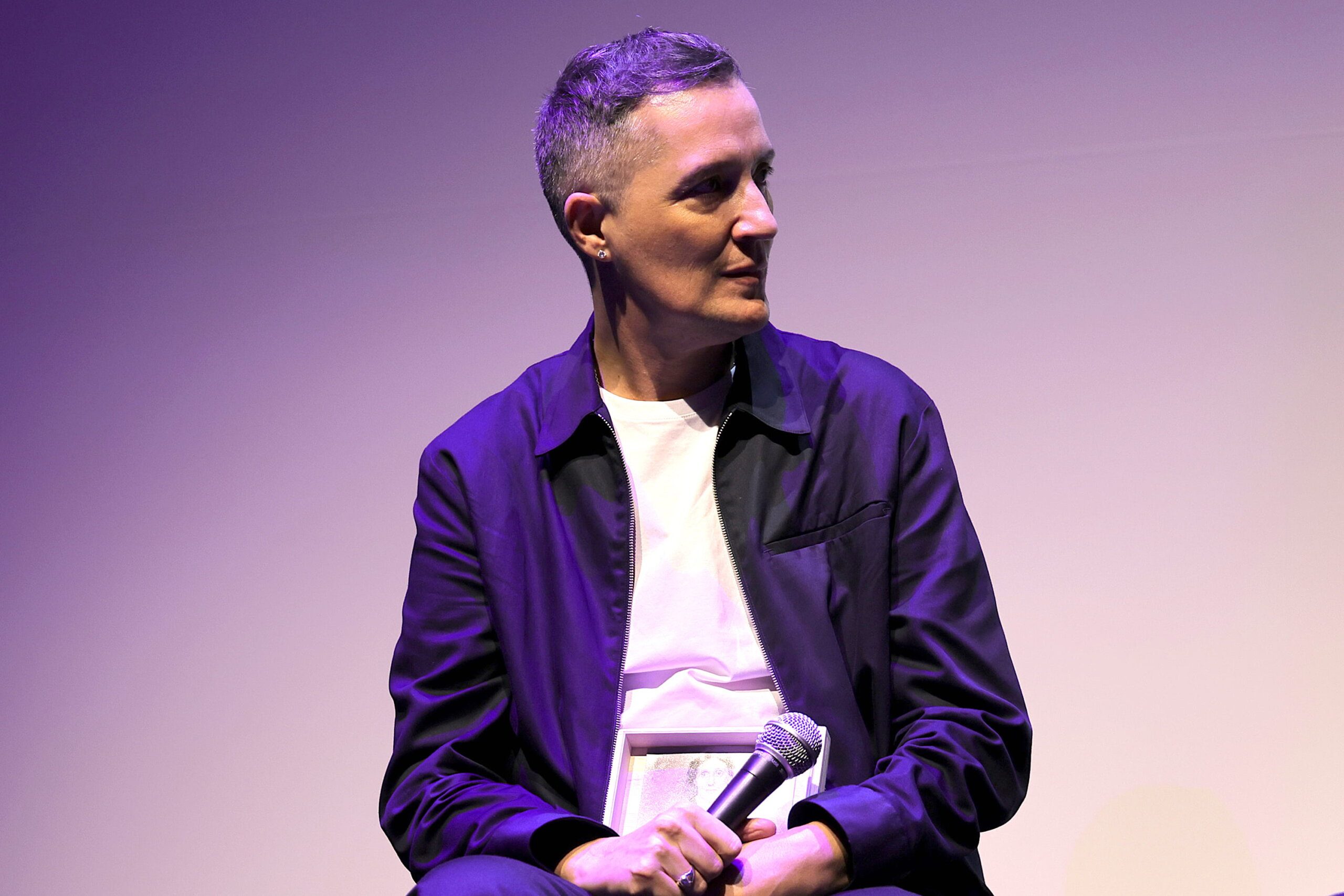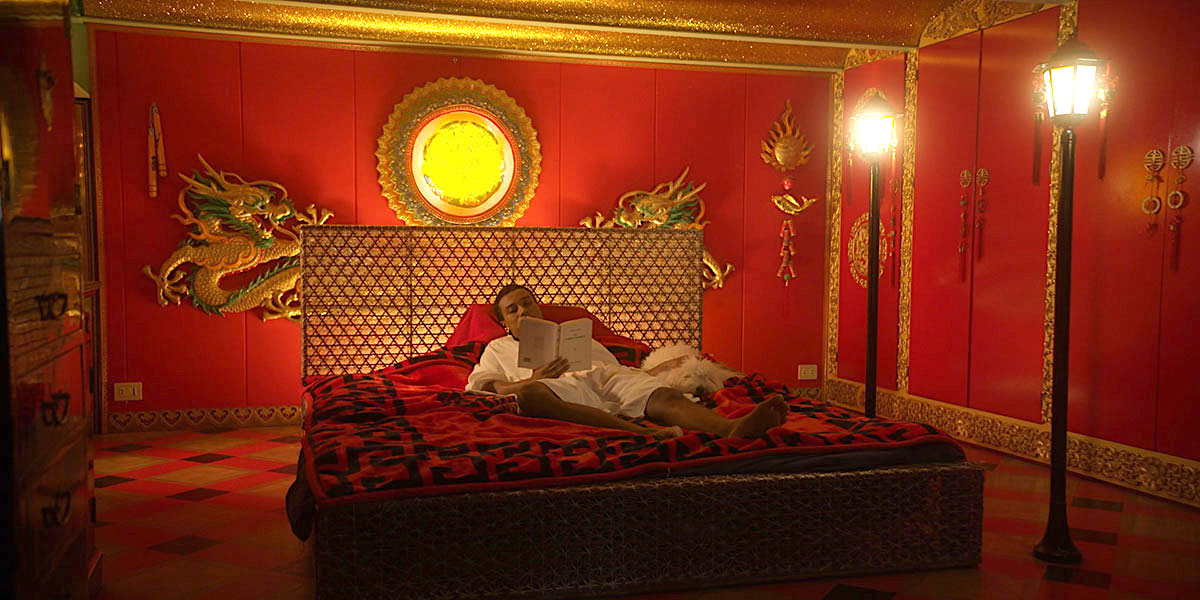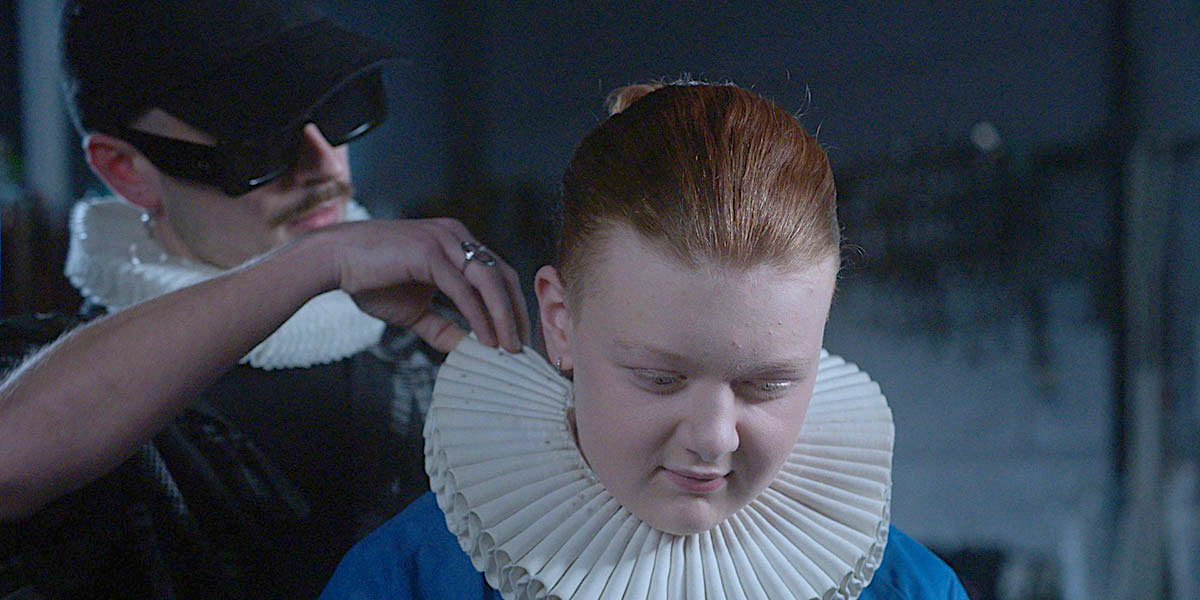When well-known writer and philosopher Paul B. Preciado was approached by a production company to make a film about his life, he suggested an adaptation of Virginia Woolf’s 1928 novel Orlando. He hadn’t intended to be taken seriously; he just wanted the well-intentioned folks to stop trying to make a film about him in the first place. “I said it as a joke! But then someone thought, ‘Wow, that’s such a good idea.’”
Before he knew it, Preciado was outside the production company’s office, dazed, with a signed contract to write and direct the film. “I get to my place and I think, ‘What am I going to do now?’ But immediately I knew that it wouldn’t be the traditional narrative of a young boy that becomes a woman—not like in the Sally Potter adaptation, which is an amazing film, but it’s a film that didn’t represent me.”
Woolf’s Orlando, a satirical history of English literature and a creative biography of her lover Vita Sackville-West, concerns a near-immortal aristocrat who mysteriously changes sex after a long sleep; it is a playful and rich text, much studied by scholars of gender, Sally Potter’s 1992 Orlando film was much lauded for its visual flair, but took a relatively typical approach to its gender narrative—revealing Orlando as either male or female through the character’s nakedness, for instance. A recent theatre adaptation in London starred non-binary actor Emma Corrin as Orlando. An adaptation by a trans filmmaker seemed, if anything, overdue.

Writer, philosopher and now filmmaker Paul B. Preciado at the New York Film Festival on Oct. 3. Credit: Michael Loccisano/Getty Images for FLC
The result, after three years of work, is Orlando: My Political Biography, an experimental French documentary with two Berlin Film Festival awards to its name. (After its Canadian premiere at TIFF, the film is screening at select theatres beginning this month, including Houston’s Film Forum on Nov. 10 and 11 and Toronto’s TIFF Bell Lightbox on Nov. 23.) The film is populated by dozens of Orlandos, all trans, of a wide range of ages and experiences; there are also carefully selected cameos from a few cis actors, including Frédéric Pierrot as an unhelpful psychiatrist, and author Virginie Despentes—Preciado’s former partner—as a judge. Using the structure of Woolf’s novel as a core, but regularly departing from it, Orlando: My Political Biography consists of interviews with the actors where they speak about themselves in Orlando’s language; direct adaptations of scenes from the book; and theatrical and artistic interludes, including a musical number in a psychiatrist’s office and a scene where various Orlandos perform surgery on a copy of Orlando.
“My Political Biography” as a subtitle is deliberately tongue-in-cheek; it is a political and biographical film, but individual biographies disappear into its fantasia-like style. Preciado describes Orlando as against “the genre of the coming out trans film,” eschewing the maudlin, formulaic or irreducibly individual for something more poetic and collective. As such, it uses Orlando’s language as a way to access freer and more abstract ways of talking about transness, and its actors practised intensively to inhabit Woolf’s language.
“Poetry is the only place where we can go if we really want to change things.”
“I wanted to encapsulate the experience of being trans, which, for me, is much larger and more politically rich than the language of dysphoria, or of needing therapy to make yourself feel better, or the legal language, all these languages that have tried to capture the experience of transitioning,” Preciado says. “I find that experience much more radical and poetic. Virginia Woolf allowed me not to stick to the ordinary ways of speaking about transness. And it was amazing, because after two days of working on the text, the cast were already speaking like Orlando themselves, and said, ‘Oh, this is much more interesting than talking about dysphoria!’”
Born in Spain and now living in Paris, Preciado is known for blending creative memoir, philosophy and history, and for his writings and activism surrounding gender (perhaps his most famous work is Testo Junkie, a creative “body-essay” about the pharmaceutical and pornographic industries, alongside his own experience taking exogenous testosterone). It’s unsurprising that he describes Orlando as a deliberate project to subvert the cis gaze in looking at trans people; he avoids, for instance, the “revelation of gender through nakedness” in both the book and Potter’s film. The framing of trans people is intimate, but focuses on clothes, interaction and gesture; the most “naked” we get is seeing Castiel Emery, who plays Sasha, show their top surgery scars.
“We could have shown many other scars,” Preciado notes, “but I wanted to show them in Sasha, because that’s what people don’t expect; they think that Sasha is the most feminine character, and it was important to me to deconstruct that binarism, and to say, ‘No, the scars are not exactly where you imagine them. They are not there just to reproduce a “male” chest; they are trying to construct and imagine a different body, not just a male body—something else.’” Transness is in the Orlandos, but it is also everywhere—the film might be said to embody a kind of non-binary spirit.
Preciado describes the film as “an invitation to connect to their inner Orlando who lives in all of us, that non-binary child in each of us. When we are kids, we are not yet fully framed or determined by binary society. I made it for the kids who are in the film.”
Most of the cast explicitly identify as non-binary, and many are openly partaking in technologies of gender transition like hormone replacement therapy (HRT) and surgery; the scene at the psychiatrist’s office includes an array of exogenous hormones, and one character injects another with testosterone. This marks a difference between common shorthand concepts of non-binary identity—often believed to be synonymous with “not cis, but not transitioning”—and how non-binariness is practised by many in real life. Preciado says he sees non-binariness as “not exactly an identity, more a practice of disidentification. I don’t want to be this binary—what is left? You are confronted by the unknown, confronted by something that has to be invented. I see it as a project of emancipation, a practice of freedom. Ideally, it should lurk in many of us.”
This is part of why Orlando, which in a bluntly literal sense is the story of a man turning into a woman, resonates far more widely than that would imply. “For me, it’s not so much about going from male to female or female to male. What I was interested in was this dissident practice of not being what you’re supposed to be, and that’s what Orlando is about. Orlando is about change, mutation, from what society has expected you to be. There are many ways of being Orlando,” Preciado says.

A scene from “Orlando: My Political Biography.” Credit: Courtesy of TIFF
Orlando is a beloved text for Preciado, but his film also grapples with the text’s knottier and more troubling elements—its enmeshment with British colonialism and racism, for instance. Woolf’s own relationship to colonialism was complicated: as scholar Sonita Sarker notes in a 2013 essay, Woolf expressed anti-colonial sentiments throughout her life, but these sentiments are “limited by a lack of knowledge about the ‘other’ and coexist with a retreat into a pride in being English.” The book also includes racial slurs, alongside a heavily orientalist treatment of the Romani people Orlando stays with in Constantinople. “The book is very exoticizing at points; it’s not a book I will embrace fully,” says Preciado. “At many moments, [Woolf] can be homophobic, transphobic, racist. But what is interesting about her book is that she’s struggling with, and against, all of those things directly in the writing.”
A sequence near the beginning of the film, which includes various beautiful shots of the Orlandos talking and sleeping in the arms of ruined sculptures, is filmed in an abandoned colonial park in Paris. “When the colonial fair was organized in France at the end of the 19th century, they constructed a park to represent the different colonial territories at the time,” Preciado says. “Nobody knows what to do with it; they don’t want to destroy it, but they don’t want to reconstruct it, because nobody in France wants to deal with this colonial past. So I knew that Orlando would have spent his/her/their childhood in that park. I wanted to portray England in that park.”
Things can feel desperate for trans people at the moment, in France as elsewhere, and Preciado was conscious of this during the casting and filmmaking process. The film includes several young trans children, who were cast on the basis of having already chosen to be in the media in France. “They’d been fighting to have their name changed on their passport, they’d been fighting to be accepted at school,” Preciado says. The children have a deliberately small role in the film, but they were often on set. “I didn’t want the children to be exposed as objects of a gaze. I wanted them to be in the film, but in a way that respected the vulnerability of childhood. But Jenny [Bel’Air, an older trans woman in the film] and the children met and had conversations, and that was so important to me, to see them together.”
Filming together as a group of trans actors, Preciado says, “became like a political ritual,” and the scenes “were like moments of political therapy. I haven’t done the film from the traditional position of a director. We came together through these moments. It was much more like a political activist project.” Two things about the film that most resonated with me were the imaginative power of transness, and the political power of art. Orlando does not plead with anyone, least of all cis people, but it feels like an incipient experiment in new ways of being and talking.
“Poetry is the only place where we can go if we really want to change things,” says Preciado. “I don’t think any change is going to come from the state. I think we can change the state, but it won’t take care of us or give us any kind of freedom. Freedom will come from imagination, poetry, fiction.”


 Why you can trust Xtra
Why you can trust Xtra


